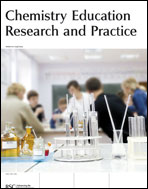Target inquiry: changing chemistry high school teachers' classroom practices and knowledge and beliefs about inquiry instruction
Abstract
Inquiry-based instruction requires a deep, conceptual understanding of the process of science combined with a sophisticated knowledge of teaching and learning. This study examines the changes in classroom instructional practices and corresponding changes to knowledge and beliefs about inquiry instruction for eight high school chemistry teachers. These teachers were part of a 2½ year program that supported a research experiences for teachers with a summer of materials adaptation and a year-long action research project. Classroom observations scored with the Reformed Teaching Observation Protocol and semi-structured teacher interviews using the Inquiry Teaching Beliefs (ITB) instrument were used to examine changes in teachers' classroom teaching practices and their knowledge and beliefs about inquiry instruction. Results indicate that both teachers' instructional practices and their knowledge and beliefs about inquiry instruction changed during the program; however, in most cases, substantial changes to classroom instruction did not occur until after the materials adaptation component. Additionally, validity issues associated with using the ITB instrument for long-term interventions were discovered.

 Please wait while we load your content...
Please wait while we load your content...